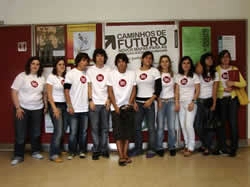
Science on Holidays
From the 21st to the 25th July 2008, secondary school students had the opportunity of contacting with the research carried out by CES.
Shooting-point
Researchers: José Manuel Pureza, Sílvia Roque e Rita Santos
‘Besides several hunting weapons, pistols and ammunition, two war weapons were also apprehended (…)’. News such as this are illustrative of the frequent presence of small arms in violence practices in Portugal. Yet, this is a reality that is insufficiently studied, both regarding the dimension of the problem and the profound motives and types of effects. This summer programme integrated two main components: firstly, the study of the proliferation and use of weapons in Portugal (survey of bibliography, statistical data, etc); secondly, the conduction of empirical work through questionnaires and interviews with specialists of the public security sector in Coimbra.
The digital gap in internet use
Researchers: Virgínia Ferreira and Mónica Lopes
The digital gap between sexes is a phenomenon internationally studied by social analysts. We know, since the 80s, that men and women have different approaches and styles regarding computer use. Recent studies continue to confirm different uses of the internet by boys and girls – boys with a more recreational and exploratory style and girls with a more utilitarian and communicative one. The aim of this programme consists in attesting, through interviews, to the possible changes in user styles of boys and girls (in the age group 18 to 24 year olds), now that the age group differential is being increasingly narrowed in Portugal.
Possible views: the different uses of image in contemporary societies
Researchers: Giovanni Allegretti, Juliana Torquato and Cristiano F. Lima
Image can be used as a form of observing, revealing and discovering the world, allowing for a more critical reflection on social, political, cultural and environmental issues. Hence, this programme aims at exploring the different uses of image in the social sciences and their contribution towards constructing critical views regarding social issues. The activities carried out included the exploration of audio-visual resources (such as films and photos), illustrating the possible uses of images in social sciences, and field trips during which images (photographs) chosen by participants to reflect their concerns regarding contemporary societies were created.
Additional information - cienciaviva@ces.uc.pt
Download the brochure
